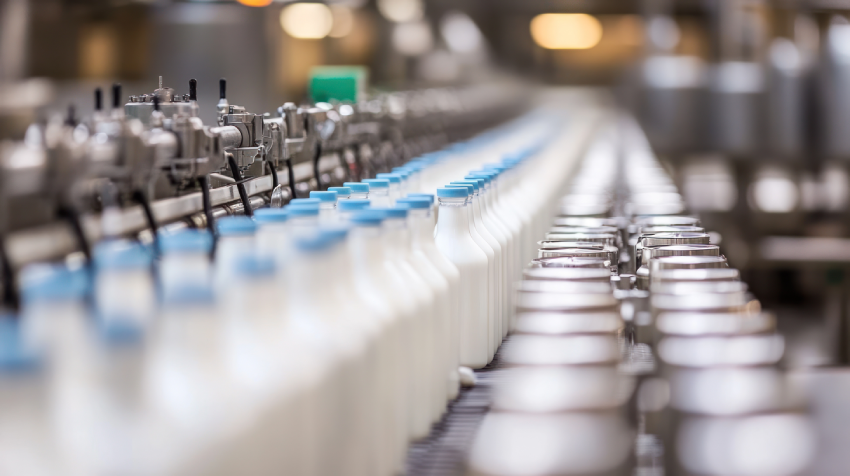ERP Systems for Manufacturing in Continuous Dairy Processing
Modern dairy manufacturing plants are dynamic, high-throughput environments where split-second decisions and seamless coordination make all the difference. That’s why ERP systems for manufacturing have become essential—not just for managing day-to-day operations, but for building a sustainable, scalable business model in continuous dairy processing. Whether you’re dealing with raw milk intake, pasteurization, or product packaging, the right ERP setup helps keep processes flowing and information visible.
Here’s how the right tools, tailored for process manufacturing, help dairy processors stay ahead of spoilage, compliance risks, and market demand.
Real Time Monitoring in Dairy Processing
In a continuous process like dairy manufacturing, a five-minute delay can mean a full batch lost—or worse, contaminated product slipping past unnoticed. That’s where real-time monitoring comes in.
With the right ERP modules in place, plants can track everything from temperature and pH levels to clean-in-place (CIP) status and valve sequencing. These aren’t just compliance checkpoints—they’re decision-making tools. Real-time data analytics allows operators to react immediately, not after the fact.
The advantage? You don’t just respond to problems, you prevent them. ERP systems with real-time capabilities create a safety net that flags anomalies, automates alerts, and keeps production moving within spec. No more waiting for reports. No more chasing paper logs. Just actionable data, live.
Batch Traceability for Compliance
Even in continuous processing, batch-level tracking still matters. Think of cream, yogurt, or specialty milk products that require unique ingredients or have short shelf lives. Batch traceability means knowing exactly where each input came from, when it was processed, and where it went next.
This isn’t just nice to have, it’s non-negotiable for compliance with food safety standards and audits. A process manufacturing ERP built for dairy makes this easier by linking raw material intake, processing stages, and packaging events in one system.
The result? When a recall hits, or even just a customer inquiry, you can trace backward and forward through the supply chain in seconds. You can also prove, with confidence, that your internal checks and balances worked. That’s a compliance win, but also a brand reputation win.
ERP Modules for Dairy Manufacturing
Let’s get specific. Not all ERP systems are created equal, especially when you compare process manufacturing ERP to discrete manufacturing ERP. Dairy processing falls squarely in the process category. You’re not assembling parts; you’re transforming raw, often perishable inputs into finished products with tight regulatory oversight. So, which ERP modules matter in this context?
- Production planning and scheduling: Match real-world output with demand forecasts and plant capacity.
- Quality management: Capture lab test results, manage hold/release statuses, and record deviations.
- Inventory control: Handle variable inputs (like raw milk) that don’t behave like fixed SKUs.
- Maintenance tracking: Downtime is costly—track equipment performance and plan service in advance.
- Compliance reporting: Build custom reports to meet regional standards like FSMA, GFSI, or HACCP.
- Customer integration: Align production with contracts, forecasts, and private label requirements.
Dairy manufacturing plants often need hybrid ERP systems that blend the structured rigor of ERP with the flexibility to handle short runs, seasonal products, and frequent formulation changes. If your system can’t handle that kind of variation, it’s not built for dairy.
Supply Chain Management in Dairy Plants
Supply chain management in a dairy operation is a moving target. You’re managing inbound raw milk, coordinating storage limits, tracking aging inventory, and responding to real-time demand signals from distributors and retailers.
ERP systems for manufacturing must include strong supply chain capabilities, not just for purchasing and logistics, but for synchronizing operations across the plant. This is where customer integration matters too. Forecasts, order patterns, and delivery requirements from your customers should connect directly into your ERP to help plan procurement and production.
Because dairy doesn’t wait. Milk has to move. Products have to ship. And shelf life? It’s ticking from the moment the tanker pulls in.
With a unified supply chain module, you can minimize waste, shorten lead times, and make better use of real-time data analytics to adapt quickly. It’s not just about optimization—it’s about survival in a fast-paced, margin-tight market.
Whether you’re expanding capacity, refining your compliance processes, or replacing legacy tools, ERP systems for manufacturing in continuous dairy processing need to be built with the realities of your plant floor in mind. From real-time monitoring to batch traceability and supply chain integration, every piece matters—and so does the way they connect.
If you’re ready to see how a dairy-specific ERP strategy can work in your plant, contact us at SoftTrace. We help processors in the dairy industry implement practical, modular ERP systems that support process integrity, traceability, and decision-making, without disrupting what’s already working.
